For the past five years, the Palma Futuro project has built up robust social performance systems to improve conditions for workers at every level of the palm oil supply chain in Colombia and Ecuador through engagement inside and outside of the workplace.
We spoke with Leyla Patricia Baquero Uribe and Maria Camila López Navarro, who led Palma Futuro’s community engagement efforts in Colombia. Leyla and Maria Camila tell us about their experiences working closely with communities and the impact of the project.
What were your roles in the Palma Futuro project?
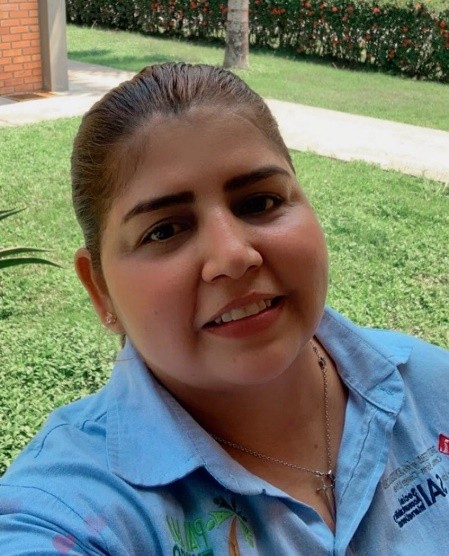
LEYLA: I was the Community Engagement Consultant for Palma Futuro and supported all the community activities in Colombia.
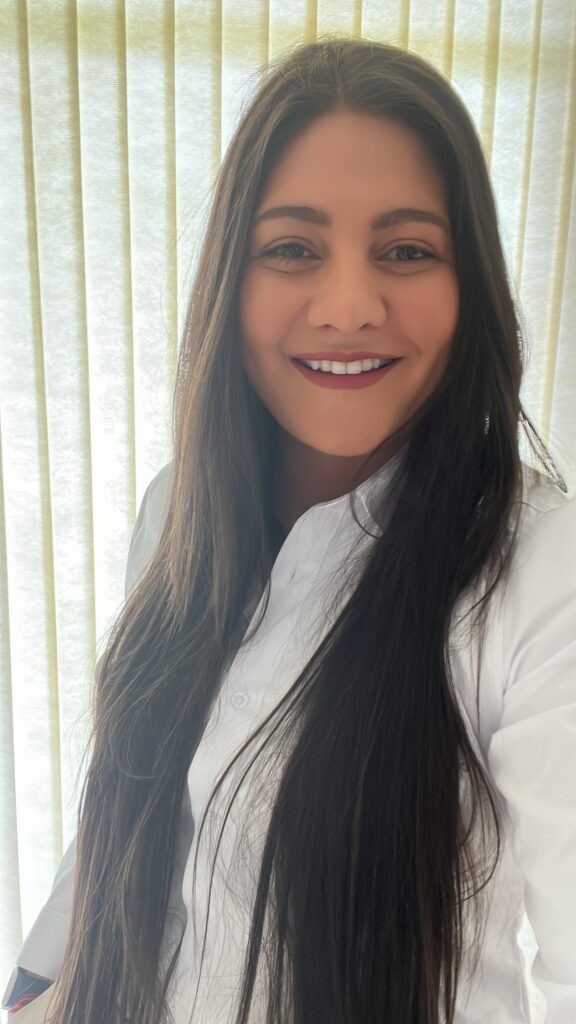
MARIA CAMILA: I was the Community Engagement Coordinator for Palma Futuro. I was responsible for engaging with communities in Colombia that were impacted by our private sector partners and their supply chains, to build trust and bridge the gaps between them. Part of my role was developing the Palma Futuro community engagement methodology in Colombia, which we then later applied to communities in Ecuador.
We engaged with 53 communities in Colombia, so having the two of us to manage them all was important. As the only team members living in Colombia, we also supported the lead trainers in conducting training with extraction plants and assisted them in conducting initial assessments of palm oil producers, especially during the pandemic. We also contributed to identifying and implementing awareness-raising activities with different stakeholders involved in the project.
Why is engaging with communities a critical component of Palma Futuro’s methodology?
LEYLA: Humans are social beings – we need relationships, but conflicts can arise. SAI understood that there needed to be a bridge between the private sector partners and the communities, so we worked to improve communication between them through coordinating meetings, providing training, and addressing the needs of both. Our goal was for communities, private sector partners, and suppliers to better understand the importance of their relationship to one another.
MARIA CAMILA: Surrounding areas are always impacted in some way by any industry, and workers often come from nearby communities. Historically, communities have not always been included by companies in their processes and are rarely asked what their concerns are. As part of Palma Futuro’s mission, we worked to improve this dynamic between the private sector and communities, so that companies and communities work together to address issues, and to solve problems that build trust, both for workers and their communities, to maintain constructive relationships and to embrace sustainability.
What was the process of engaging with communities in Colombia like?
MARIA CAMILA: The first step was to sit with our private sector partners and identify which communities were impacted (either positively or negatively) by their own operations and by their supply chains. It was challenging when we first began this work, because it was during the COVID-19 pandemic – and private sector partners were more concerned with surviving than engaging with communities. The pandemic also contributed to the already wide gap between the two parties.
Once we identified these communities, we made visits to meet with community leaders to explain the goals and scope of Palma Futuro. We then conducted diagnostic studies in the communities to understand their unique contexts, needs, and how they were impacted by risks of child labor, forced labor, and unacceptable conditions of work. From there, we worked together with them to form Community Circles and began implementing trainings on elements of the social compliance system.
It was challenging at first. We found that many communities in Colombia and Latin America were skeptical of empty promises from organizations or projects who do not follow through or provide impactful resources. After spending a lot of time in the communities, talking with community members regularly, and making efforts to understand their situations – we began to build their trust.
It was important to create safe spaces like the Community Circles, because we were dealing with very sensitive topics. Our Community Circles continued to grow through the years – one went from about ten people at the beginning to over 60 by the end of the project. Community members participated in a variety of ways – such as sharing their experiences during community circle meeting, building awareness in social compliance system to other community members, making snacks to share, and offering their own houses and community rooms for the Palma Futuro meetings and trainings.
After beginning our work with communities, we began to involve our private sector partners and engage with them to better understand how to best approach and communicate with communities based on the diagnoses. We brought employees (members of the Social Performance Teams, trainers or sustainability teams, for example) with us to the meetings and encouraged them to internally address issues in the communities – such as improving their environmental impact in their surrounding areas.
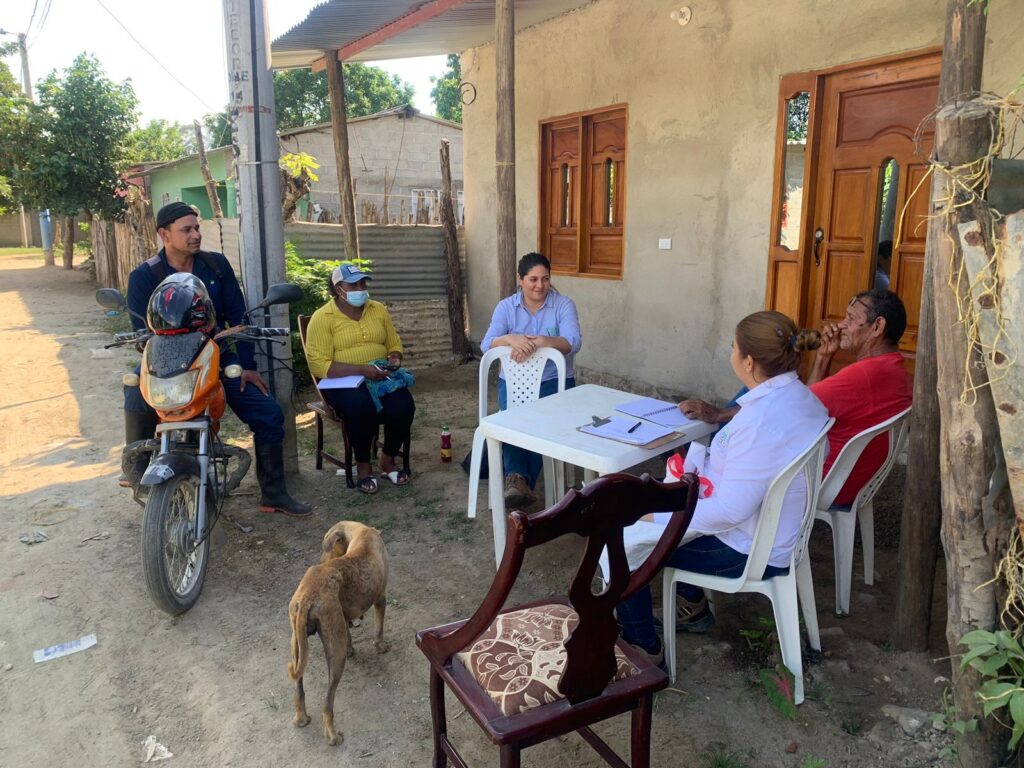
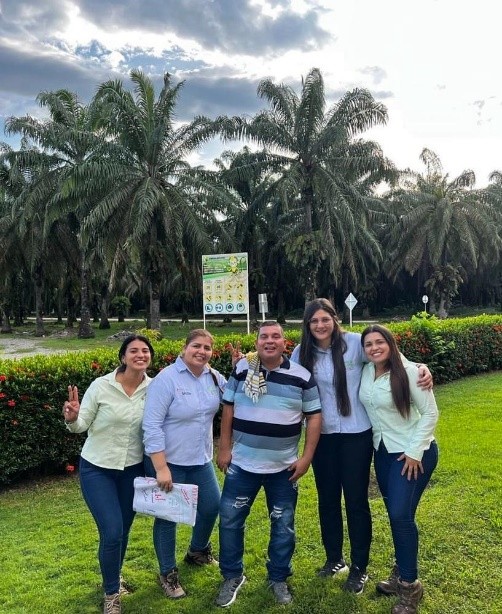
What are some examples of actions that Community Circles implemented with your team’s support?
LEYLA: In all our activities, we always reinforced Palma Futuro’s objective of raising awareness and preventing any risks related to forced labor and child labor. In one community, we helped facilitate the creation of a community mural, which transformed an area of the community that had been in poor condition for a long time. We brought together the local school members, police, children, parents, and other community members to help organize and create the painting, which spread the message about preventing child labor.
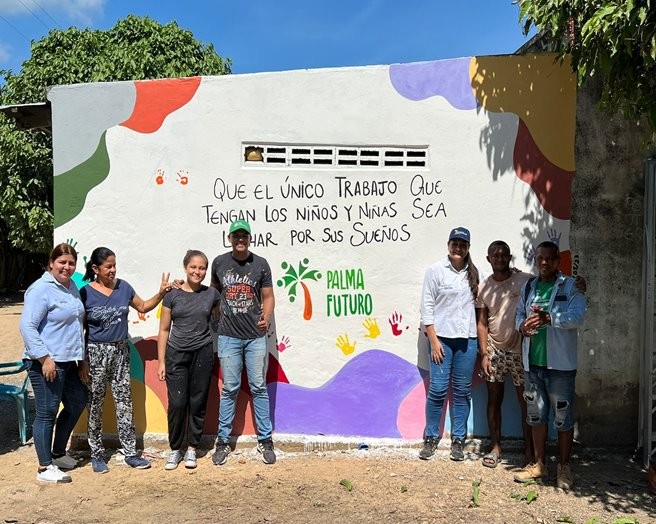
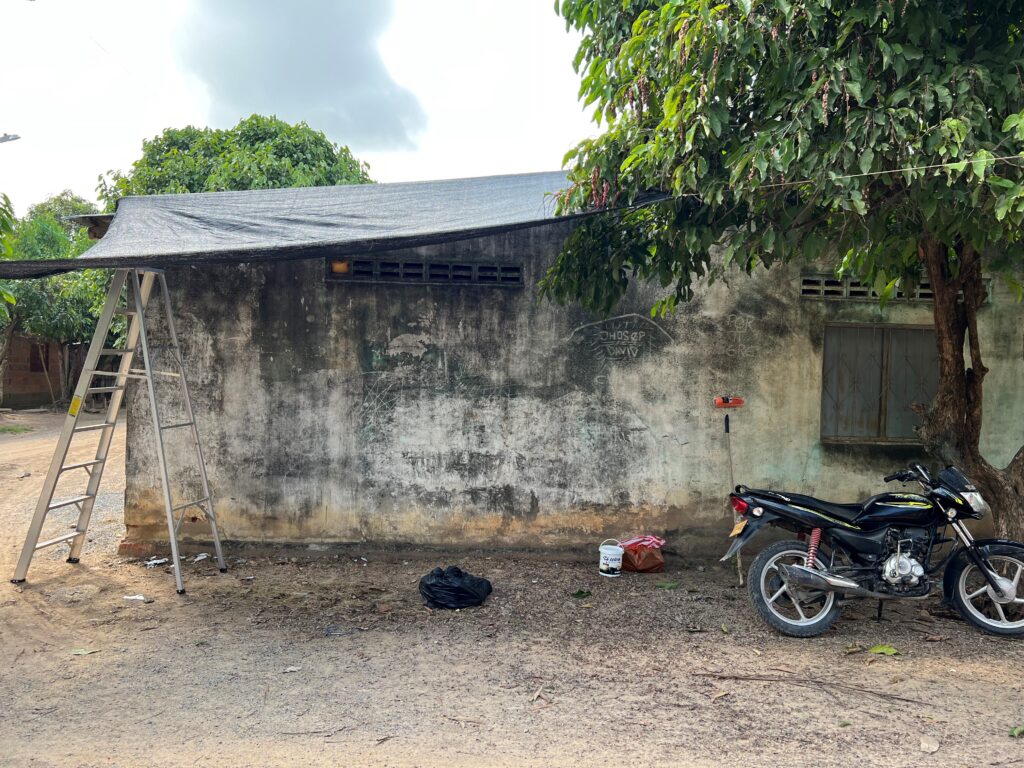
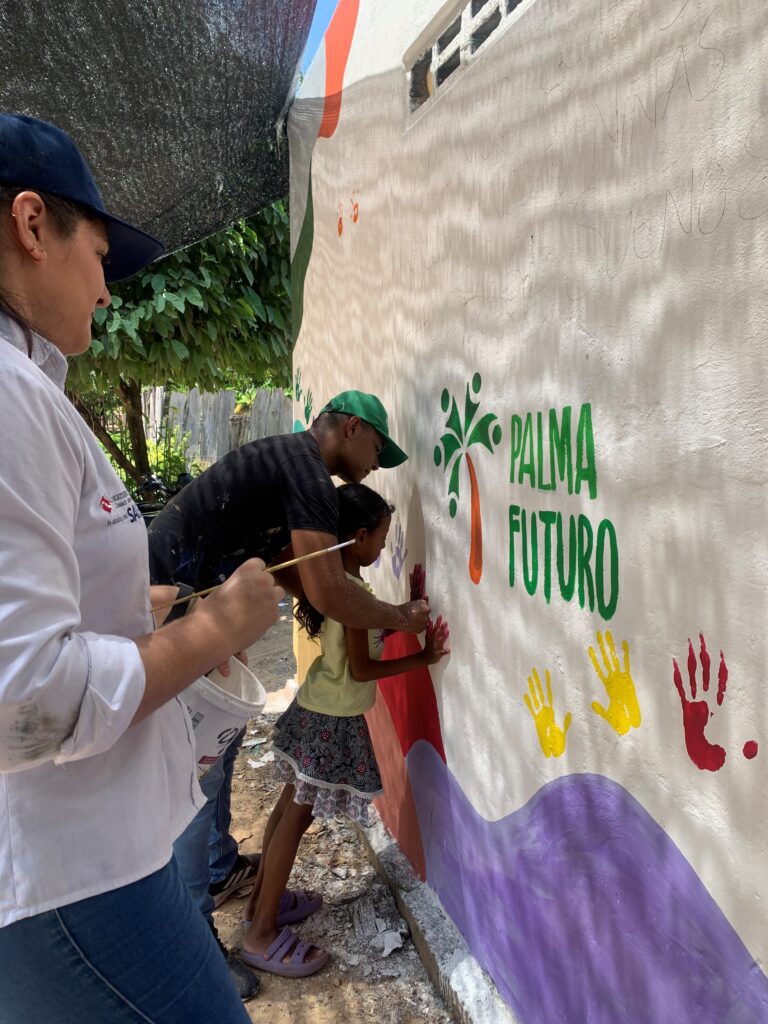
MARIA CAMILA: There are so many examples, but another was when we brought together sustainability team representatives from three palm oil companies to meet in a school in a community in Magdalena, Colombia. They created a campaign with parents, school administrators, and children to identify the risks of child labor, the importance of not having children on plantations, and how best to take care of their local environment as a sustainable commitment. After this discussion, the palm oil companies led a tree-planting event where they taught the children about which trees grow best in certain types of soil (near the river), how to take care of them, the importance of their existence to protect the community during the rainy season, and why it’s important to take care of the environment, comparing it to taking care of children. The event was also an opportunity for the companies to emphasize the importance of being aware of the risks of child labor and staying in school. This activity brought the entire community and the palm oil companies together in a way that had never happened before.
Now that the project has finished, how have you seen its impact?
LEYLA: The most impactful thing for me was how grateful people were for us just to be there. We spent many hours driving to communities and made sure to honor the commitments and agreements made with the communities, come rain or shine. People in some of these rural communities are not always given the resources and opportunities they deserve, and we felt that it was key for us to be there for them and to help them feel heard.
Also, as we have mentioned, we became a bridge between palm oil companies and the communities – this was a particularly important outcome of the project. Since the pandemic, these companies have had no communication with the communities. We were able to reintroduce companies to their surrounding communities and create spaces where community members could be heard.
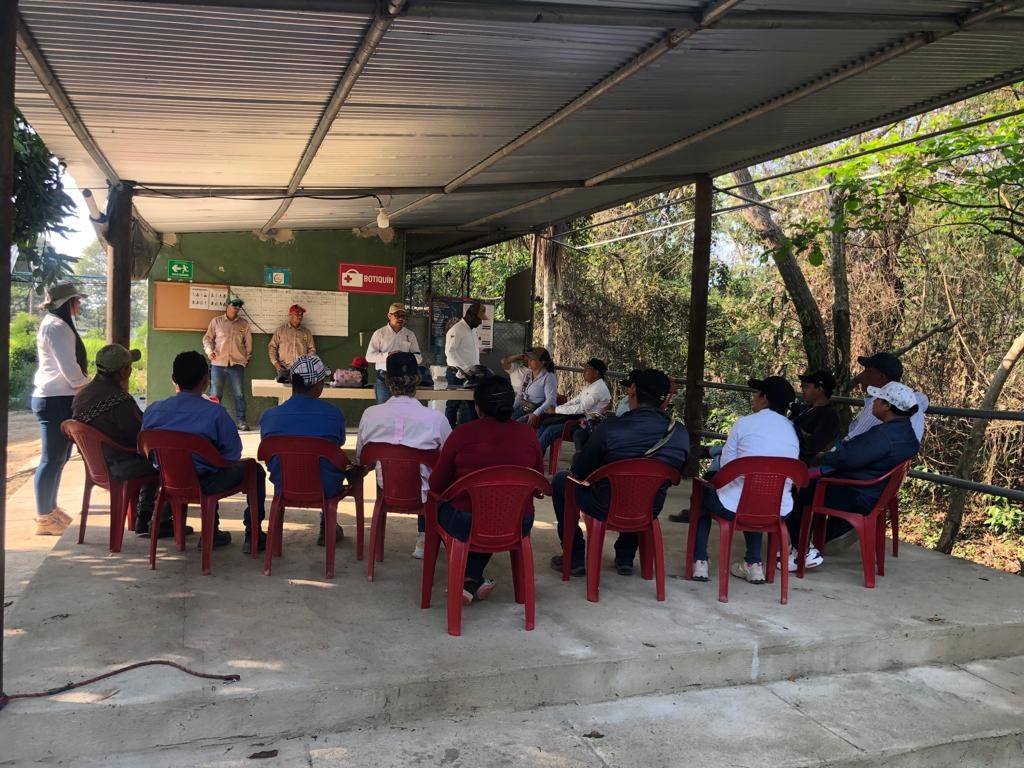
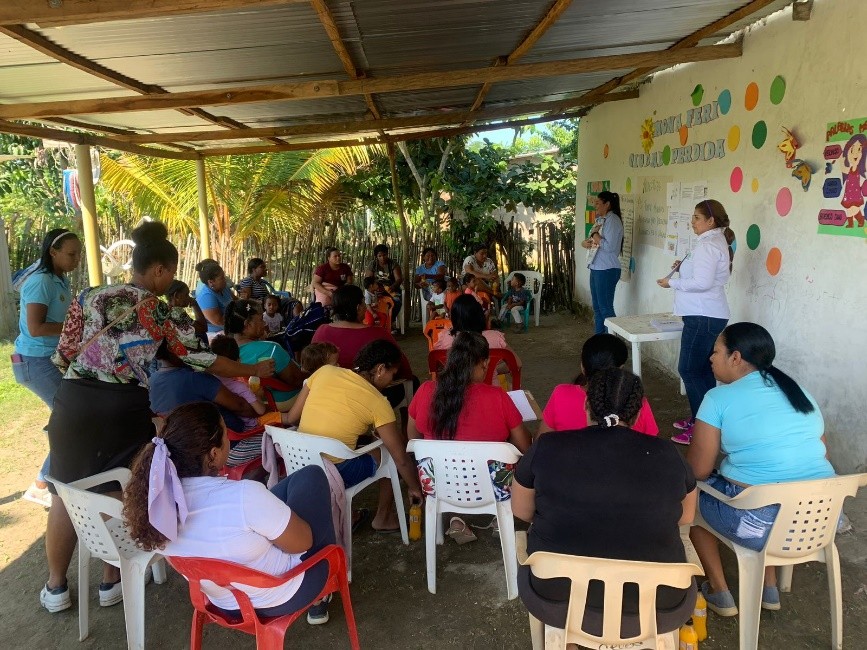
MARIA CAMILA: We also helped companies to understand that each community is different, and even if they are close to one another, they all have unique needs. It was important for companies to understand this so that they could better approach each community.
Communities deepened their understanding of child labor, forced labor, and other labor risks – better understanding that rights apply to everyone and not just a few. Community leaders began to disseminate knowledge throughout their communities and began requesting trainings – such as how to resolve conflicts with the private sector. They became more aware of how and why to provide complaints and suggestions to nearby palm oil companies through grievance mechanisms and identified stakeholders to report cases when necessary. As we saw people begin to better understand their rights and stand up for them, it was extremely impactful for us.
Was there a particular moment during your work with Palma Futuro that you found especially impactful?
LEYLA: We knew that many of the parents who attended the “Experiences and Stories Festivals” had difficult childhoods themselves – many left school for work to help support their families. We also knew that many of them had never had the opportunity to attend events like this, with entertainment, games, dancing, storytelling, and more. At the festivals, you could really see the happiness and emotions on their faces. This was so impactful for me, to be able to provide this space for joy in their lives, knowing that they were also learning to change their lives and the lives of their families, neighbors, friends, and community members now and in the future.
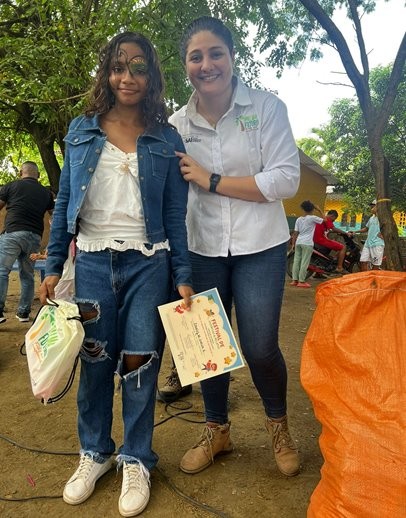
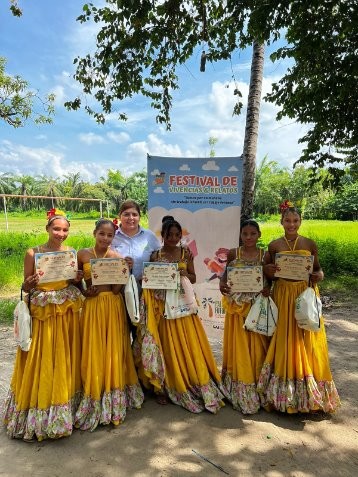
MARIA CAMILA: There were many impactful moments throughout the project. We went into it knowing that communities often are not provided adequate resources and services, and they often feel left behind. The mindset of community members really transformed throughout the project, as we saw them understand that knowledge can be a tool to advocate for rights and guarantee better opportunities. Seeing people gain this confidence to make changes and improvements on their own really meant a lot to me.
For example, one community used stakeholder mapping to make connections and obtain resources needed to improve the conditions in their local school, and others began requesting training courses from the Ministry of Labor to provide more employment opportunities for community members (including women and young people).
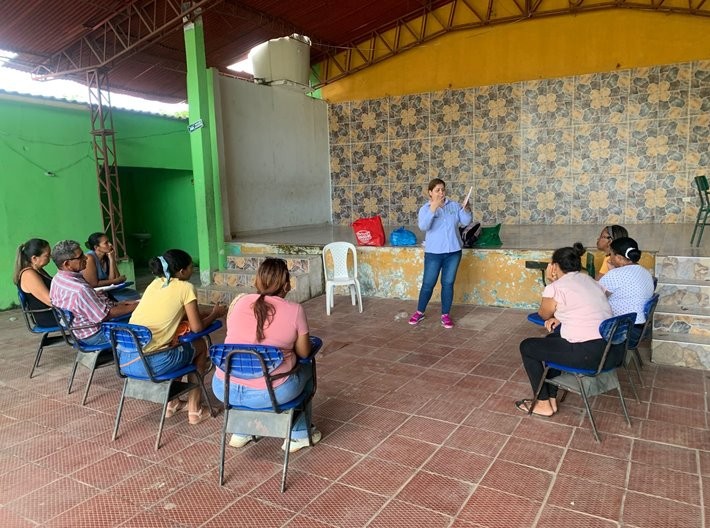

Can you tell us about your background and how you became involved with Palma Futuro?
LEYLA: My background is in psychology; I was a psychologist with ICBF (Colombian Institution for Family Welfare) for many years, where I worked with all kinds of people across all ages out in their communities. This work required understanding how to best connect with and approach people with unique backgrounds and needs.
Prior to this, I worked with the Fundepalma Foundation, where I supported several social and community projects including the Comprehensive Early Childhood Care Strategy, which served pregnant mothers and young children. In this role, I also worked with palm oil communities in social responsibility projects.
In my role with Palma Futuro, this background was extremely useful, as we worked with so many people throughout communities and within companies – navigating conflicts, systemic issues, and hardships. I am incredibly grateful for the opportunity to work with Palma Futuro and with these communities.
MARIA CAMILA: I have been working on various social projects since getting my college degree. Most recently, I worked with Fundapalma, the charitable foundation of the Biocosta group of palm companies. My role was to oversee all the projects for social responsibility for six palm oil extractor plants in this group located in Magdalena, Colombia. I traveled daily to communities to meet with community members and leaders to hear about their needs, complaints, and try to solve their issues with the extractor plants. Through this role, I got to know many people in the industry and was eventually connected to Palma Futuro. I really enjoyed these activities, so I was incredibly happy to continue this type of work with Palma Futuro.
Leyla and I both relied on our backgrounds for this project and were very committed to the mission of Palma Futuro. While our goal was to train community members, we ended up learning so much from them, which really changed our lives. Their openness to sharing their experiences with us helped us to better understand their ways of learning, their unique strengths, and how best to help them make a real difference in their communities.
Funding is provided by the United States Department of Labor under cooperative agreement number IL-32820-18-75-K. 100 percent of the total costs of the project is financed with federal funds, for a total of 6,000,000 US dollars. This material does not necessarily reflect the views or policies of the United States Department of Labor, nor does mention of trade names, commercial products, or organizations imply endorsement by the United States Government.
